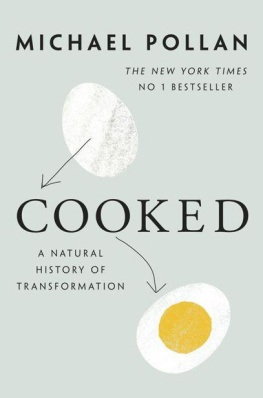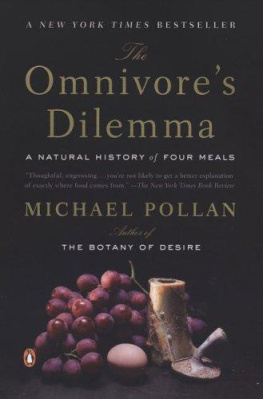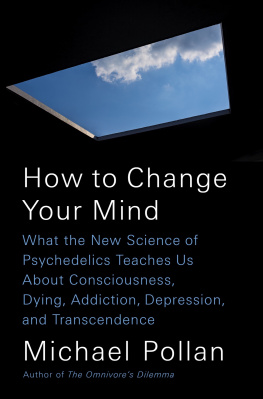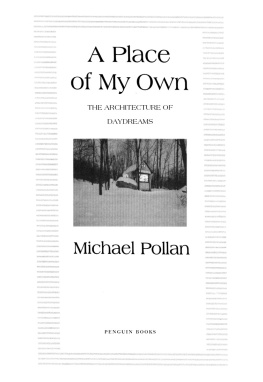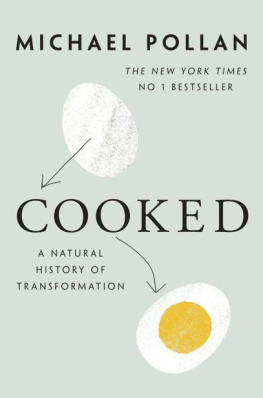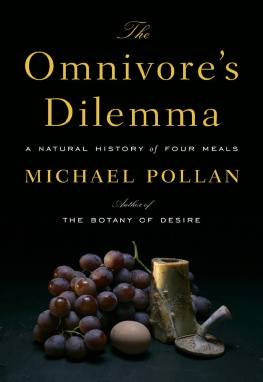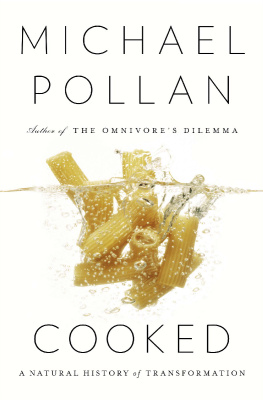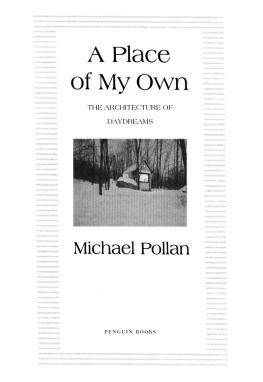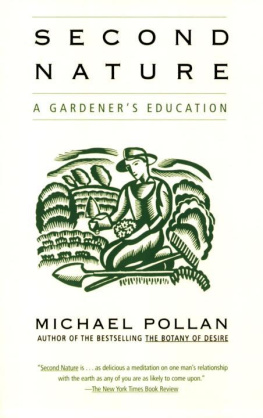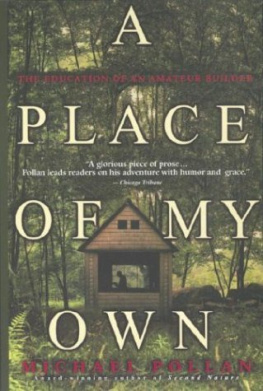Michael Pollan - Cooked: A Natural History of Transformation
Here you can read online Michael Pollan - Cooked: A Natural History of Transformation full text of the book (entire story) in english for free. Download pdf and epub, get meaning, cover and reviews about this ebook. year: 2013, publisher: Penguin Group US, genre: Home and family. Description of the work, (preface) as well as reviews are available. Best literature library LitArk.com created for fans of good reading and offers a wide selection of genres:
Romance novel
Science fiction
Adventure
Detective
Science
History
Home and family
Prose
Art
Politics
Computer
Non-fiction
Religion
Business
Children
Humor
Choose a favorite category and find really read worthwhile books. Enjoy immersion in the world of imagination, feel the emotions of the characters or learn something new for yourself, make an fascinating discovery.
- Book:Cooked: A Natural History of Transformation
- Author:
- Publisher:Penguin Group US
- Genre:
- Year:2013
- Rating:4 / 5
- Favourites:Add to favourites
- Your mark:
Cooked: A Natural History of Transformation: summary, description and annotation
We offer to read an annotation, description, summary or preface (depends on what the author of the book "Cooked: A Natural History of Transformation" wrote himself). If you haven't found the necessary information about the book — write in the comments, we will try to find it.
In Cooked, Michael Pollan explores the previously uncharted territory of his own kitchen. Here, he discovers the enduring power of the four classical elementsfire, water, air, and earthto transform the stuff of nature into delicious things to eat and drink. Apprenticing himself to a succession of culinary masters, Pollan learns how to grill with fire, cook with liquid, bake bread, and ferment everything from cheese to beer. In the course of his journey, he discovers that the cook occupies a special place in the world, standing squarely between nature and culture. Both realms are transformed by cooking, and so, in the process, is the cook.
Each section of Cooked tracks Pollans effort to master a single classic recipe using one of the four elements. A North Carolina barbecue pit master tutors him in the primal magic of fire; a Chez Panissetrained cook schools him in the art of braising; a celebrated baker teaches him how air transforms grain and water into a fragrant loaf of bread; and finally, several mad-genius fermentos (a tribe that includes brewers, cheese makers, and all kinds of picklers) reveal how fungi and bacteria can perform the most amazing alchemies of all. The reader learns alongside Pollan, but the lessons move beyond the practical to become an investigation of how cooking involves us in a web of social and ecological relationships: with plants and animals, the soil, farmers, our history and culture, and, of course, the people our cooking nourishes and delights. Cooking, above all, connects us.
The effects of not cooking are similarly far reaching. Relying upon corporations to process our food means we consume large quantities of fat, sugar, and salt; disrupt an essential link to the natural world; and weaken our relationships with family and friends. In fact, Cooked argues, taking back control of cooking may be the single most important step anyone can take to help make the American food system healthier and more sustainable. Reclaiming cooking as an act of enjoyment and self-reliance, learning to perform the magic of these everyday transformations, opens the door to a more nourishing life.
Amazon.com ReviewAn Amazon Best Book of the Month, April 2013: Who has untangled the nature of modern Americas relationship with food more effectively than Michael Pollan? After sharing the experience of growing his own food in Second Nature, he illuminated how our appetites drive the evolution of edible plants with The Botany of Desire. Then he pondered The Omnivores Dilemma, weighing our precarious food chain and popularizing the pleasures of eating local; In Defense of Food and Food Rules distilled his conclusions into a manifesto and a manual. With Cooked, he closes the seed-to-table loop with a passionate exploration of the satisfying transformation of grilling, braising, baking, and fermenting--and their primal roots. Learning to cook elevated humans from lone animals into increasingly intelligent, civilized groups, and though we spend scant time doing real cooking, weve become obsessed with watching people cook--a paradox that points to longing for a lost experience. Through his own experiences making and enjoying food with pit masters, chefs, bakers, and fermentos, he retraces our path to connection with real ingredients and health for people and planet. Whether youre sympathetic or skeptical, you cant help but appreciate Pollans genius for conveying the elemental appeal of making a meal. --Mari Malcolm
From BookforumEven when hes championing his ethical concerns, Pollan is a researcher, a prodigious gatherer and synthesizer of vast reams of information. Having throughly scutinized every other link in the food chain, he finally turns his skills to the one link missing from his repertoire. And in the process, he learned to cook. The chapters and their signature recipes are meant to stand in for the traditional four elements (water, earth, air, and fire). And each of these natural forces, Pollan writes, signifies one of the great transformations of nature into culture we call cooking. The authors project is, in fact, nearly as all encompassing and essential as the elements themselves, ranging across several disciplines, embracing perspectives both stringently objective and deeply personal, and introducing us to a novels worth of colorful characters whom he enlists to teach him the cooking method at hand. Cooked is a potently seductive invitation to discoveror rediscover our most primal connection to the natural world, and it will likely induce more than a few readers to dust off their little-used pots and pans and to brush up on some essential knife skills. The only problem with Cooked is that, at a lengthyalbeit entrancing450-some pages, itll be quite a while before you get back into the kitchen. Linda Delibero
Michael Pollan: author's other books
Who wrote Cooked: A Natural History of Transformation? Find out the surname, the name of the author of the book and a list of all author's works by series.

